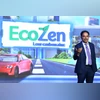Vedanta-owned Hindustan Zinc (HZL), India’s largest zinc producer, has launched EcoZen, Asia's first low-carbon green zinc brand. It has been developed to meet the growing demand for sustainable and environmentally-friendly materials, particularly in the automotive sector.
Manufactured using renewable energy, the carbon footprint of EcoZen is about 75 per cent lower than the global average.
EcoZen claims to have less than one tonne of carbon emission produced for every tonne of zinc made.
This initiative aligns with HZL's goal of achieving net-zero emissions by 2050.
The use of EcoZen in galvanising one tonne of steel is expected to avoid around 400 kilograms of carbon emissions.
The automotive industry is a significant consumer of zinc, primarily for galvanisation to protect steel from corrosion.
More From This Section
EcoZen believes that due to its lower carbon footprint, it presents an opportunity for car manufacturers striving to lessen their environmental impact.
By using EcoZen, carmakers can contribute to a reduction in overall carbon emissions throughout the vehicle's life cycle.
Currently, Hindustan Zinc has 75 per cent of market share in India. For the automotive industry, the market share of zinc is the same as steel — around 30 per cent.
Hindustan Zinc aims to leverage EcoZen to further solidify its position in the automotive sector.
The company is also exploring opportunities beyond lead, zinc, and silver. It has established a new subsidiary to focus on critical mineral exploration alongside the Indian government.
A significant portion of the Indian auto sector utilises galvanised steel for production, especially for vehicles destined for export.
“Cars that are galvanised with EcoZen will have a lower carbon footprint throughout their life cycle. This is becoming increasingly important for automakers as countries around the world are implementing stricter environmental regulations,” said Arun Misra, chief executive officer (CEO) of Hindustan Zinc.
Mishra added, “Due to Vedanta’s demerger, our strategy has changed as we will concentrate on expanding in India and exploring new opportunities beyond lead, zinc, and silver.”
He said, “We've established a new subsidiary for this purpose, working alongside the central government to find critical minerals. Our South African, Zambian, and Namibian assets are now under the base metal category with Chris Griffith at the helm. They will be driving expansion there.”
Hindustan Zinc is currently in discussions with its clients to gauge long-term demand for EcoZen. The company is also investing in renewable energy sources like solar and wind power to further reduce its carbon footprint. This is to meet its ambitious target of producing 30-35 per cent of its zinc using renewable energy by next year.
The primary application of zinc is for the galvanisation of steel, providing corrosion resistance. Zinc is a critical mineral for various sectors, including steel, infrastructure, automotive, renewable energy, electronics, hi-tech manufacturing, energy storage, defence, and electric mobility.
Pointers
- Aims to meet the demand for eco-friendly materials, particularly in the auto industry
- Made with renewable energy, resulting in a 75% reduction compared to the global average
- EcoZen claims to produce less than one tonne of carbon emissions per tonne of zinc
- Established to focus on critical mineral exploration with the Indian government.
- Aims to produce 30-35% of zinc using renewable energy by next year
)